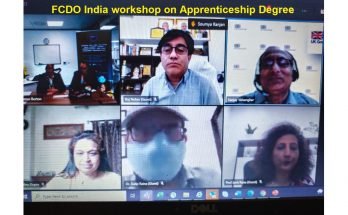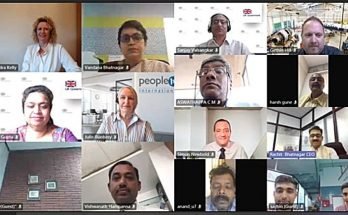New Delhi: DFID India in collaboration with DIT UK held a knowledge sharing session on 11th June on the good practices adopted in the UK for assessments and certification in vocational education, including some of the recent digital assessment practices introduced for post COVID-19 scenario.
The event was attended by over 130 delegates from across Government, Sector Skill Councils (SSCs), Third Party Aggregators (TPAs) and Industry players. Ms. Anu Gupta, Head of Skills, DFID India opened the webinar briefing participants about DFID’s work in India under the Skill for Jobs Programme and the impact of COVID-19, which has demanded a holistic approach to vocational education built on the pillars of green recovery and social inclusion.
Ms. Kaustubhi Harit, Skills Policy Lead, DFID India provided an overview of the Indian assessment and certification ecosystem and highlighted important areas of collaboration between UK and Indian players and the increased focus of Indian policy makers on creation of uniform global standards.
Vicky Mose, Director, Global Products and Services ABE UK, spoke about the disruption in learning due to COVID-19 and response by UK. She emphasized that giving paramount importance to the continuity of learner’s journey, regulators in the UK were quick to roll out an Emergency Regulatory Framework (ERF), which provided the awarding bodies with varying options for evaluation like Calculated Grades and adapted assessments. She mentioned the awarding bodies provided customized solutions tailored to the needs of the students to conduct evaluation and future progression in a timely fashion.
Robert Mitton, CEO and Co- Founder, Outcourse Group, spoke about the evolving trends and the importance of digital assessments to support wider adoption of online learning. He mentioned about the role of chat-bots, digital assistants and increased use of machine learning solutions can play in enhancing learning experience, conducting standardized delivery and assessments. He spoke about the scope of growth and scalability of the technology solutions and the need to provide students a more personalized learning experience.
In conclusion, all the speakers highlighted the current scenario demanded greater investment in digital infrastructure, enhanced collaboration between government, industry, students, higher education institutions in defining standards, developing curriculum, providing funding, conducting skills assessments etc. to build a more resilient TVET sector which can cater adequately to the demands of the workforce in the future.
The session was concluded with a Q&A session and a note of thanks to the participants.



